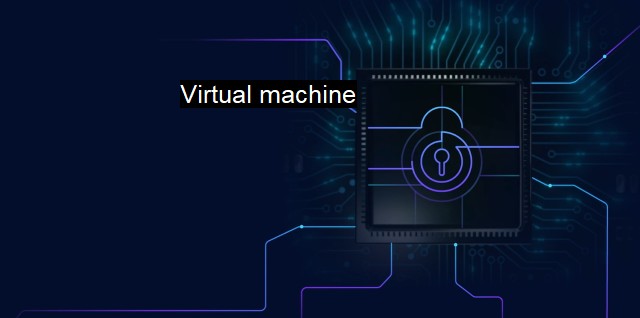What is Virtual machine?
The Role of Virtual Machines in Cybersecurity: A Software-Based Emulation Protecting Against Malicious Activities and Enabling Remote Work
A virtual machine (VM) is a virtual environment that functions parallel to a physical computer. Put simply, it is software-assisted emulation of a computer system identical to the original. The user can run different operating systems and multiple applications on one physical machine simultaneously, each with their own processing capacity, memory, and data storage space within the VM.Virtual machines are crucial. VMs provide an added layer of security because they isolate the computing environment. If a virtual machine is compromised, the intruder cannot access the host machine or other virtual machines running on the same host. Some IT professionals use virtual machines to bring forth unique and specific cybersecurity circumstances to design and test firewall rules and security alerts, minimizing potential threats.
Through a VM, cybersecurity professionals can replicate numerous real-world scenarios to test cybersecurity measures as per the execution environment that encounters countless threat scenarios every day. It provides an effective way to study the behavior and forthcoming countermeasures for sophisticated malware attacks in a controlled setting.
Another important context where VMs come in handy is anti-virus testing. If an antivirus company desires to test a new solution, it wouldn't be productive, safe, or pragmatic to do so on the main operating system where mission-critical applications are in function. Instead, tests can be carried out on a VM where the software's effect does not propagate beyond the VM if something goes wrong. Each VM essentially operates as its own universe. Anything that happens inside a VM doesn't impact anything outside of it. Thus, VMs can allow for rigorous testing before antivirus software is allowed to interact with the public.
Having highlighted some major use cases of virtual machines, it’s worth mentioning that VMs aren't virtually invincible. Cybercriminals too harness VMs' power to launch highly sophisticated cyberattacks, sometimes even specifically crafted to thwart VM-based defences. Malware like Crisis and VMZeus is well known for this. Hence, companies who rely on VMs for digital defence need to continually update and upgrade their cybersecurity strategies to outmaneuver these complex exploits.
Even though VMs can be potentially employed by cybercriminals, they remain an indispensable part of contemporary cybersecurity measures. The cost benefits, increased efficiency, adaptability, and scalability make them appealing for deploying centralized cybersecurity frameworks.
They provide real working replicas of users’ environments, thus enabling them to comprehend the multiple pronged attack possibilities, assess the security breaches, perform effective system audits, and make proactive security decisions. This provides greater resilience to the ever-increasing, unconcealed, and latent threats from cyber attackers.
From an antivirus perspective, VMs hold remarkable instrumental value to perform dynamic analysis of suspicious programs. You can execute these programs in a secluded environment, mitigating any immediate threat to the system, and then closely monitor the destructive or intrusive activities. It helps in not only detecting spearheads but also researching behaviour to gain useful insights into future initiatives in combat zones.
The concept of virtual machines intertwines deeply with the indispensable elements of cybersecurity and anti-virus assessment, prevention, and development. While they might not form an unbreachable wall of security, they compliment layers of reactive and proactive mechanisms working holistically, coping with the ceaseless advancements of cyber threats. This two-sided enameled power, with its immense potential for implementing security eco-systems, reflects why current and future strategies must leverage the dynamic capabilities of virtual machines in the landscape of cybersecurity.

Virtual machine FAQs
What is a virtual machine?
A virtual machine is a software program that emulates a computer system or an operating system, enabling users to run different applications and programs on a single physical machine. The virtual machine is isolated from the host operating system and provides a secure environment to test and run software applications.How does a virtual machine improve cybersecurity?
A virtual machine enhances cybersecurity by providing a secure and isolated environment to test and run software applications. Virtual machines can be created to replicate different operating systems, software configurations, and user environments, allowing security analysts to test patches, security updates, and software vulnerabilities without compromising the host operating system. This reduces the risk of malware infections, data breaches, and other security issues.Can an antivirus program run on a virtual machine?
Yes, antivirus programs can run on a virtual machine. However, it is recommended to use a dedicated virtual machine for antivirus testing to prevent conflicts with other software applications and ensure the accuracy of the results. Additionally, some antivirus programs may detect the virtual machine as a threat and disable some of its features or functionality.How can virtual machines improve antivirus testing?
Virtual machines can improve antivirus testing by providing an isolated and secure environment to test different malware samples and virus definitions. With virtual machines, security analysts can test antivirus programs with different operating systems, software configurations, and user environments without affecting the host system or network. This allows for more comprehensive and accurate testing of antivirus software, which can lead to better detection rates and improved cybersecurity.| | A | | | B | | | C | | | D | | | E | | | F | | | G | | | H | | | I | | | J | | | K | | | L | | | M | |
| | N | | | O | | | P | | | Q | | | R | | | S | | | T | | | U | | | V | | | W | | | X | | | Y | | | Z | |
| | 1 | | | 2 | | | 3 | | | 4 | | | 7 | | | 8 | | |||||||